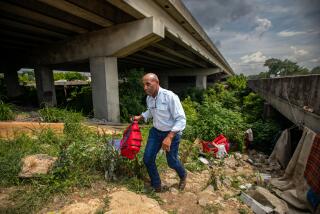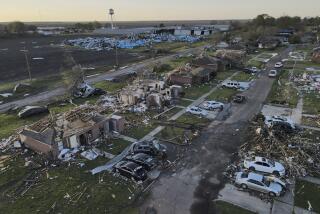People of Blue Hill, Miss.: Paint Them Wet and Happy
- Share via
BLUE HILL, Miss. — Stubby water pipes alongside the bumpy gravel road that winds through the hills of rural Mississippi are bringing people there a taste of the 20th Century that has made a real difference in their lives.
“When you’ve had to haul water from a creek or collect rainwater off the roof all your life, having it brought to your doorstep is as important to us as when they walked on the moon,” Charles Savage said.
So far, however, the 36-year-old laborer’s house has no bathroom.
Until money can be found to install and hook up indoor plumbing, Savage and his neighbors will have to keep drawing water from the plastic pipes that stand outside each home.
A federally financed project completed the main line down the road last month, and a church group paid to run pipe to each home. Now a charity drive is collecting used plumbing fixtures and money to install them.
Low Living Standard
Most residents of Blue Hill, named for the forested blue clay hills of sparsely populated Jefferson County, live in poverty. Only a few families have the luxury of a private well.
Unemployment in the southwest Mississippi county is 23.4%, the highest rate in the state.
For Blue Hill residents lucky enough to find work, it is usually cutting and hauling pulpwood or a job associated with the Mississippi River, several miles to the west. Some get work loading barges. Savage works for a company that lays stabilizing concrete mats on the river’s bank.
A few residents worked 10 years to get water to Blue Hill. Their efforts paid off when Rep. Mike Espy (D-Miss.) secured $255,000 from the Farmers Home Administration so the small Pattison Water System could extend its line eight miles to the community.
“This week marks 20 years since the United States landed a man on the moon,” Espy said last month. “It will also mark the first time ever for many Blue Hill residents to have running water. . . . It’s time for Congress to concentrate on moving rural America into modern times, along with the rest of the country.”
Church Group Helped
Janie Cole, whose family home has a well, led the drive for donations. She said a church group in Charlotte, N. C., raised $2,800 to hire a contractor to lay the water pipes from the main line along the the gravel road to the spigots just outside the houses.
Members of the Providence United Methodist Church in Charlotte delivered a truckload of used sinks.
“We’ve got enough sinks, but we’re still in need of other plumbing fixtures and money to complete the piping,” Cole said.
Until the money is found, people such as Trenessa Moore will do things the old way.
“I get water for cooking and to wash my baby from that barrel,” Moore said as she stood on the porch of the weathered shack that is home to her and her 11-month-old child. “They ran the water up to the house about a month ago and gave me a sink, but I don’t have any money to bring the water inside.”
Moore, 19, and living on welfare, said she hauls water from a neighbor’s well or from the creek to fill the 50-gallon drum beside her porch.
Dreams of a Bath
“In a way it’s like a dream to think I may soon have an indoor bathroom,” Moore said. “That means I won’t have to heat water on the stove to wash my baby.”
Cole said she and a few others appealed for years to federal officials for help but had little success until two local legislators helped her get in touch with Espy.
More to Read
Sign up for Essential California
The most important California stories and recommendations in your inbox every morning.
You may occasionally receive promotional content from the Los Angeles Times.













